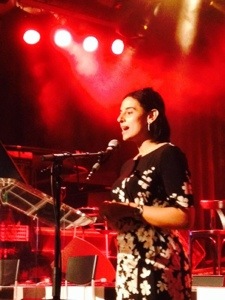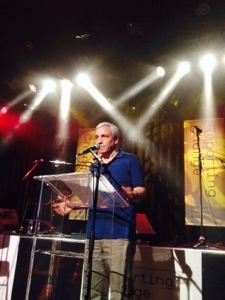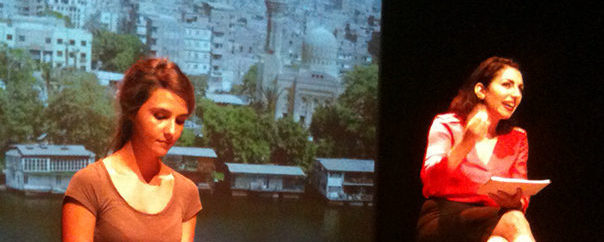Amsterdam – On Sunday, June 15, a group of Arab writers, artists and journalists, gathered in the famous pop venue the Melkweg, to tell their stories in word, song, film, and theater. This event called Reporting Change – Stories from The Arab Region, was organized by World Press Photo and Human Rights Watch. The program featured music and keynote addresses by Reem Maged and Yassin Al-Haj Saleh.
by Hatim Suleiman
The Egyptian TV journalist Reem Maged is one of the major voices of the revolution on Egyptian TV between 2011 and 2013. Yassin Al-Haj Saleh is a Syrian writer and political activist. Photojournalists from Algeria, Tunis and Egypt talked about their work, and you had to choose between watching the keynotes or the movies, ‘Return to Homs and ‘E-Team’, which we (Charlie Crooijmans and me) had to skip.
There was also a play especially made for the occasion, telling the story of the revolution through the eyes of two women. All of these stories tell so much more than what the mainstream media present us, far more human and therefore easier to identify with.

Keynote address by Reem Maged
In her touching speech Maged reflected on the past three years, remembering a few scenes from Tahrir square which changed her forever. She recalled the difficult decisions of choosing between being “on air or being on the square”, and the later decision to quit her TV job in the polarized sphere that followed the ouster of ex-president Morsi because after all “a half truth is a whole lie”.
She is sorry that many of her fellow journalists gave up their professionalism, as they believed the country is in a war which changes priorities (against the Muslim Brotherhood and Islamist terrorism). It is a choice she doesn’t understand. For her a journalist’s professional values and ethics are just as valid as those of medical doctors: if tampered with, it could kill.
Documenting life in the Arab region
Nadia Benchallal, a French Algerian photographer who grew up in France, made a reverse crossing of the Mediterranean in 1992 from France to Algeria that her parents left in the 1950s. She went at a time when the country was entering a bloody civil war that lasted through most of the 1990s. In her work Nadia focused on the private sphere of ordinary people -especially women- going through their daily life amidst the conflict. It is a beautiful collection of shots of life in the Algeria of the nineties, even one from a Miss Algeria selection competition!
Egyptian photographer Roger Anis’ photos tell a story of hardships of an economy largely dependent on tourism, with no tourists. The Algerian Oualid Khelifi photos tell a story of marginalized and alienated Tuareg people. The Tunisian Salim Harbi exposed the repressive nature of a controversial Tunisian drugs law.
‘We have seen a revolution’
The actresses Nazmiye Oral and Maryam Hassouni performed in a play called ‘we have seen a revolution’. The actresses played the parts of two women, one from Egypt and the other from Libya. Each woman took her turn to tell the audience about her experiences, which were completely different from one another. But both have the urge to show and tell the stories in photos or reports.
Nazmiye Oral played the Libyan Hanan Salah who works for Human Rights Watch in Libya. The real Hanan Salah, was also present at the theater – afterwards there was a short interview – said the most tragic thing in Libya is the fact that there are more weapons than people and nobody can do a thing about it. As an outsider Salah had no difficulties in being a woman.
The Egyptian photographer Eman Helal, played by Hassouni, was challenged in a different way. At times she felt torn between the need to show to the world the sometimes shocking images of harassment and violence against women, but on the other hand having to accept the limitations of her editor.
Concert by Syrian singer-songwriter
During an interlude of music the audience was enchanted by the beautiful voice of Waed Bouhassoun who -accompanied only by her ud- sang 4 pieces of Arabic classical poetry.

Keynote address by Yassin al Haj Saleh
The Syrian writer and political activist Yassin Al-Haj Saleh, a humanist intellectual with a clear ethical voice, shared deep insight of his vision on change and how it applies to the Syrian revolution. He explained there is a difference between two words that express different forms of change in Arabic: “taghayur versus taghyeer” (التغيير – التغير). While the first, taghayur, describes a dynamic within society or man himself, where he affects and is affected by change, the second, taghyeer, describes a change enforced by a will or force outside of one’s self or the society. The latter has always been a more organized change, based on a full-fledged ideology and with a pre-determined result.
He mentions the colonization mission civilisatrice or civilizing mission as an example. Post-colonial national regimes modeled their vision for the shaping of society in the same manner. The newly independent regimes were modeled and inspired by the communist example. Yassin considers the current jihadist and fundamental Islamism that strives to force change on society according to an ideology or pre-defined future ideal as the latest example. He sees this inevitably leading to dictatorship. In Syria‘s case this vision of change even led to what he calls “political slavery”: the regime not only rules the country but owns it as well. The Arab republic of Syria became ´Syria Al-Assad´, ´Assad’s Syria´, as it is often called by pro-regime media.
The difference between these two forms of change constitutes a difference between freedom versus salvation. Yassin sees one of the challenges of the Syrian revolution is that many Arab and western intellectuals, from both the political left and right still believe in the second form of change where people have to be guided, a view made easier in the west by the dominating orientalist idea that Arabs, easterners, Muslims etc, are inherently “different”.
Yassin acknowledges the challenges of the Syrian experience that has almost no historical precedent: a half destroyed country, the displacement of millions, and the multi-front battles against the regime, the skeptics of the revolution and ultra fundamentalist violent religious groups. He stresses however that the right beginning is the exit of the Assad-regime. The longer it stays in power, the more pain, destruction, displacement and religious extremism Syria will suffer. Yassin asks for solidarity on a human scale for Syria’s citizens, refugees and those in captivity (including his wife and brother).
The day ended with a concert by the Tunisian band A-way Tarik.
Here is a video (nothing to do with the event) of a concert of Waed Bouhassoun, solo and collaborating with the flamenco singer Curro Piñana.
